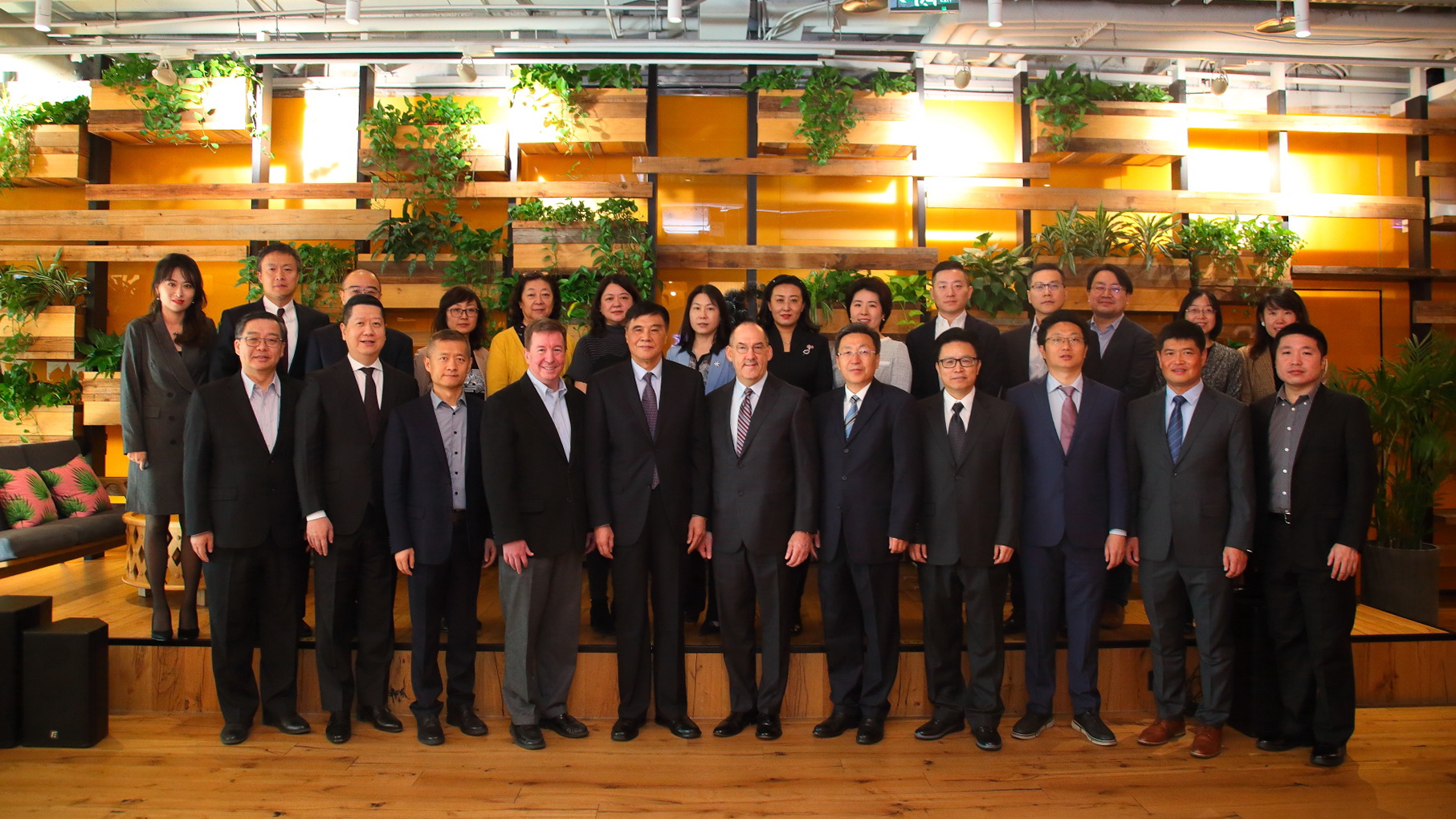Zhang Xiaoqiang Meets with Representatives from Member Companies of the American Chamber of Commerce in China
- Time:2021-12-07
- source:CCIEE
On 7 December, 2021, Zhang Xiaoqiang, Executive Vice Chairman and CEO of CCIEE, met with representatives in China from member companies of the American Chamber of Commerce in China (AmCham China) upon invitation. The two sides conducted frank exchanges on current China-U.S. economic and trade relations and how foreign companies can operate better in China.

Zhang Xiaoqiang deemed that, as Chinese president Xi Jinping stressed at the videoconference with U.S. president Biden on November 16, three principles should be upheld for the China-U.S. relations in the new era, namely mutual respect, peaceful coexistence and win-win cooperation. China and the U.S. have interwoven interests, therefore peace benefits the two while confrontation will hurt both. The two countries should adhere to mutually beneficial practice. President Xi mentioned that China and the U.S. have extensive common interests in various fields, including economics and trade, energy, technology, network and environment. Hence, the two sides should carry out frequent exchanges, make full use of complementary features, enlarge the cake of China-U.S. cooperation, and avoid politicization of economic and trade issues between China and the U.S. The two countries should keep communications on macroeconomic policies, maintain stability of supply chain and industrial chain with joint efforts, and prioritize attention to cooperation on energy security and climate change. The meeting between the two heads of state has brought confidence to international community for positive China-U.S. relations.
Zhang Xiaoqiang pointed out that economic and trade frictions between China and the U.S. have harmed the interests of business communities and the people in both countries. According to relevant data, it is hardly possible for the two to decouple in economy. In last year, under the shock of the pandemic, China’s export climbed by 1.6% while China-U.S. bilateral trade grew 8.3%, among which the value of the export from the U.S. to China reached 135 billion U.S. dollars, up by 9.8%. From January to October in 2021, the total amount of bilateral trade has surpassed that of 2020, among which the value of U.S. exports to China have exceeded 145 billion U.S. dollars. Analysis of a number of think tanks and business associations showed that 90% of the newly added tariff caused by China-U.S. trade frictions has been paid by U.S. companies and consumers. In recent days, the U.S. has been seeing severe inflation domestically, and several chambers of commerce have urged the government to cancel the excessive high tariff.

Zhang Xiaoqiang said that in late October, 2021, Chinese government released Opinions on Carbon Dioxide Peaking and Carbon Neutrality in Full and Faithful Implementation of the New Development Philosophy by the Central Committee of the CPC and the State Council and Action Plan for Carbon Dioxide Peaking Before 2030 by the State Council, which defined the main targets, directive principles and major measures to realize “dual-carbon” goals. Based on the Action Plan, different industries are making up their own action plans for carbon dioxide peaking during the 14th Five-Year Plan period, including energy, manufacturing, construction, transportation and so on. In November, China-U.S. Joint Glasgow Declaration on Enhancing Climate Action in the 2020s put forward that China and the U.S. can initiate cooperation on law framework, environment standard, incentive policy, support to sustainable energy, and policies to improve energy efficiency, etc. Primary energy consumption of China and the U.S. together accounts for 42% of the world total, with that of carbon dioxide emissions making up for 44.5%. During the green transformation, there are both huge challenges and great business opportunities. Therefore, Chinese and U.S. companies can seek for collaboration in plenty of sub- sectors. China has attached great importance to green and low-carbon transformation, and will set up effective mechanism to ensure energy security, industry security and normal life of the people based on its conditions, in the end cutting the carbon safely and using energy efficiently through a clean approach. Hence, China and the U.S. still have chances to cooperate in the field of traditional energy.
Zhang Xiaoqiang stressed that China’s high-quality development does not only cover green and low-carbon development, but also facilitates the development of digital economy and better integration of digital and real economy. After the breakout of the pandemic, people have paid more attention to health. Besides, China is on the path of becoming an aging society. In that case, China and the U.S. have extensive potential for cooperation on medicine and healthcare. To live up to people’s expectations for wonderful life, China has been expanding domestic consumption in cultural, educational and public health sectors during the “dual-circulation” process, which also offers great opportunities for U.S. companies. For digital development and information management, the two sides should seek for solution through consultation. As China is building new development paradigm, the door of opening up will only be wider and wider while the negative list for foreign investment shorter and shorter. Currently, China is expanding its market of tertiary industry, and spare no efforts to make improvement in intellectual property protection and business environment, resulting in the constantly rising status of competitive policies. All these create numerous chances for foreign enterprises. He hoped that U.S. business community can continue to play a positive role in leading China-U.S. economic and trade relations back to the normal path of healthy and stable development.
Heads of CCIEE’s International Exchanges and Cooperation Department, Research Management and Information Department and Institute of American and European Studies were present at the meeting. Greg Gilligan, Chairman of AmCham China, Alan Beebe, President of AmCham China, and representatives from AmChina China’s member companies, including Abbott, Amazon, Byer, Caterpillar, Conoco Phillips, Corteva, Dell, General Electronics, General Motors, Herbalife, Hewlett Packard Enterprise, Honeywell, Louis Dreyfus, Mars, Microsoft, Novartis, Qualcomm and Starbucks, attended the meeting.
